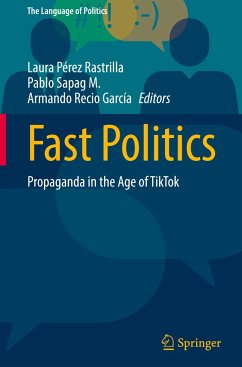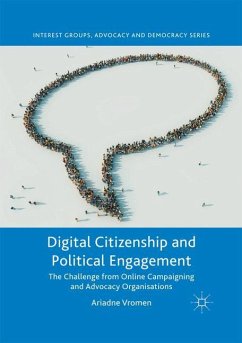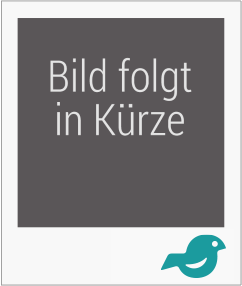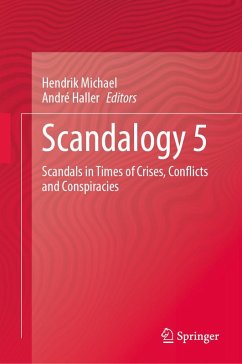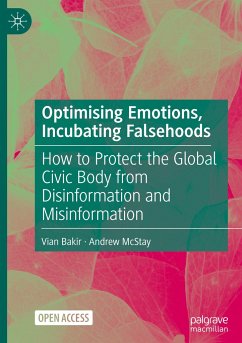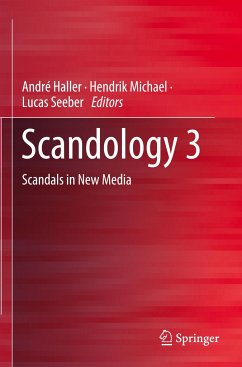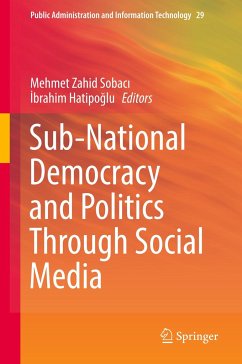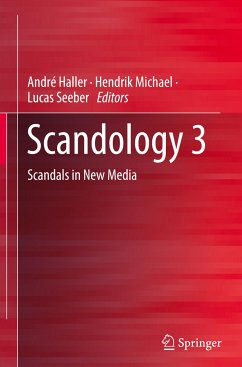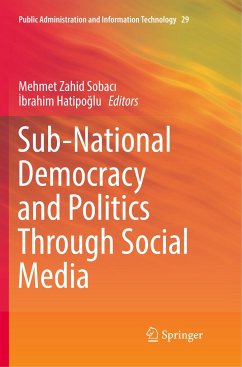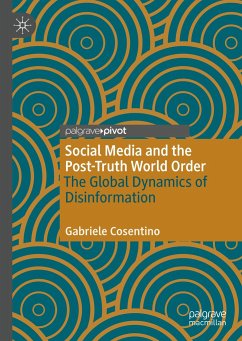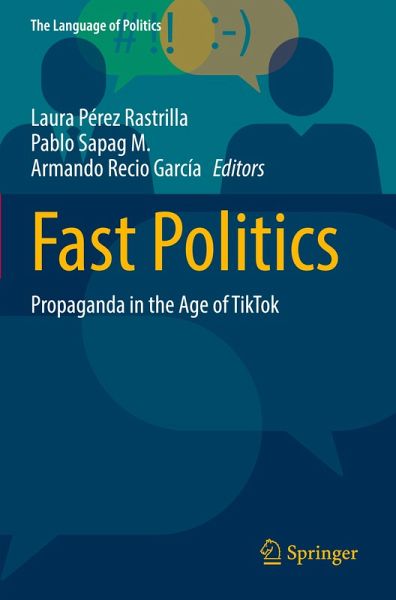
Fast Politics
Propaganda in the Age of TikTok
Herausgegeben: Pérez Rastrilla, Laura; Sapag M., Pablo; Recio García, Armando
Versandkostenfrei!
Versandfertig in 6-10 Tagen
91,99 €
inkl. MwSt.

PAYBACK Punkte
46 °P sammeln!
The goal of this book is to show the role of TikTok as a tool for political purposes. To this end, the authors analyse the messages posted on this social medium by political figures and institutions such as politicians and political parties, their impact on political landscapes, as well as the transformation of political communication techniques in order to suit the platform's features.In the last two years, the exponential growth of TikTok has led an increasing number of politicians and institutions to incorporate it into their communication strategies. The platform displays some very differe...
The goal of this book is to show the role of TikTok as a tool for political purposes. To this end, the authors analyse the messages posted on this social medium by political figures and institutions such as politicians and political parties, their impact on political landscapes, as well as the transformation of political communication techniques in order to suit the platform's features.
In the last two years, the exponential growth of TikTok has led an increasing number of politicians and institutions to incorporate it into their communication strategies. The platform displays some very different features from other social media that determine the way in which the content is presented. In addition, it manages to reach an audience that normally does not access or share political messages.
Within this context, the volume pursues two main objectives. First, to examine how the communication techniques and the peculiarities of this social medium - where short videoswith actors in informal attitudes prevail - affect the political message. A second objective is to analyse the influence of the messages distributed through TikTok that redefine political scenarios, and of the relationships of politicians and parties with voters. The core of the book comprises case studies that are organised into three parts, with nine chapters in all.
The authors are scholars and practitioners of political communication, with diverse geographical representation, who approach the topics from a range of methodological perspectives. The first part addresses the state of the art and the influence of TikTok features on the way political communication is performed. The second part discusses the influence of TikTok on electoral scenarios and political culture in India, Bangladesh, the United States, and Ecuador. Finally, in the third part, TikTok is analysed as an instrument for promoting far right politicians and parties in Europe, as in the case of MatteoSalvini in Italy, and AfD in Germany and Vox in Spain.
The volume is oriented to both scholars and communication professionals, such as journalists, communication consultants, and speechwriters, who want to become familiar with the platform, learn about its political impact, or wish to deepen their understanding of transformations in communication techniques and their adaptation to this growing social medium.
Chapter 2 "The Moving Body as the Articulator, Meme and Affective Link in Political Communication on TikTok" is available open access under a Creative Commons Attribution 4.0 International License via link.springer.com.
In the last two years, the exponential growth of TikTok has led an increasing number of politicians and institutions to incorporate it into their communication strategies. The platform displays some very different features from other social media that determine the way in which the content is presented. In addition, it manages to reach an audience that normally does not access or share political messages.
Within this context, the volume pursues two main objectives. First, to examine how the communication techniques and the peculiarities of this social medium - where short videoswith actors in informal attitudes prevail - affect the political message. A second objective is to analyse the influence of the messages distributed through TikTok that redefine political scenarios, and of the relationships of politicians and parties with voters. The core of the book comprises case studies that are organised into three parts, with nine chapters in all.
The authors are scholars and practitioners of political communication, with diverse geographical representation, who approach the topics from a range of methodological perspectives. The first part addresses the state of the art and the influence of TikTok features on the way political communication is performed. The second part discusses the influence of TikTok on electoral scenarios and political culture in India, Bangladesh, the United States, and Ecuador. Finally, in the third part, TikTok is analysed as an instrument for promoting far right politicians and parties in Europe, as in the case of MatteoSalvini in Italy, and AfD in Germany and Vox in Spain.
The volume is oriented to both scholars and communication professionals, such as journalists, communication consultants, and speechwriters, who want to become familiar with the platform, learn about its political impact, or wish to deepen their understanding of transformations in communication techniques and their adaptation to this growing social medium.
Chapter 2 "The Moving Body as the Articulator, Meme and Affective Link in Political Communication on TikTok" is available open access under a Creative Commons Attribution 4.0 International License via link.springer.com.



